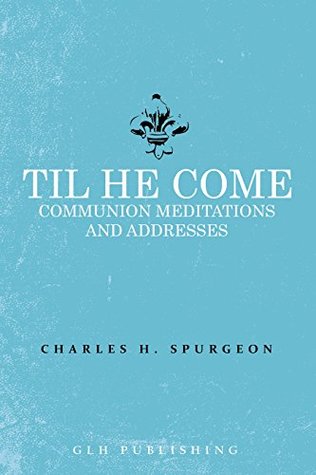- Biblia
- Leer la Biblia
- Versiones de la Biblia
- Verso del dia
- Planes de lectura
- Versos por tema
- Books of the Bible
- Imágenes De La Biblia
- Estudio
- Comentarios
- Concordancias
- Diccionarios bíblicos
- Enciclopedias bíblicas
- Sermones
- Bible Atlas & Maps
- BP Wiki
- Devocionales
- Devocionales de hoy
- Light of the World
- Todos los devocionales
- Inspirational Quotes
- Más
- Picture Quotes
- Videos
- Inspirador
- Estudio Bíblico
- Lo que dice la Biblia
- Bible Q&As
- Daily Bread
- Bible by Genre
- Bible Stories
- Random Bible Verse
- Comunidad
- Store
Til He Come: Communion Meditations and Addresses
by Charles Spurgeon
For many years, whether at home or abroad, it was Mr. Spurgeon's constant custom to observe the ordinance of the Lord's supper every Sabbath-day, unless illness prevented. This he believed to be in accordance with apostolic precedent; and it was his oft-repeated testimony that the more frequently he obeyed his Lord's command, "This do in remembrance of Me," the more precious did his Saviour become to him, while the memorial celebration itself proved increasingly helpful and instructive as the years rolled by. Several of the discourses here published were delivered to thousands of communicants in the Metropolitan Tabernacle, while others were addressed to the little companies of Christians,—of different denominations, and of various nationalities,—who gathered around the communion table in Mr. Spurgeon's sitting-room at Mentone. The addresses cover a wide range of subjects; but all of them speak more or less fully of the great atoning sacrifice of which the broken bread and the filled cup are the simple yet significant symbols. Spurgeon had intended to publish a selection of his Communion Addresses; so this volume may be regarded as another of the precious literary legacies bequeathed by him to his brethren and sisters in Christ who have yet to tarry a while here below. It is hoped that these sermonettes will be the means of deepening the spiritual life of many believers, and that they will suggest suitable themes for meditation and discourse to those who have the privilege and responsibility of presiding at the ordinance.
BUY NOW
Kindle Edition, 226 pages
Published September 18th 2016 by GLH Publishing (first published December 31st 1969)
Suscribir
© 2025 Bibleportal.com Reservados todos los derechos.

He was converted to Christ at the age of 16 and immediately began preaching. He preached in the streets and in the fields before he was 21. In his first church, he began with 100 members. It grew until he was preaching to 10,000 people in the Surrey Music Hall. His church, the Metropolitan Tabernacle, seated 6,000 people. He withdrew from every movement among English Baptists which tended to criticize the Authorized Version 1611 in any way.
Before his death, he published more than 2,000 sermons and 49 volumes of commentaries, sayings, anecdotes, illustrations, and devotions.
... Show more